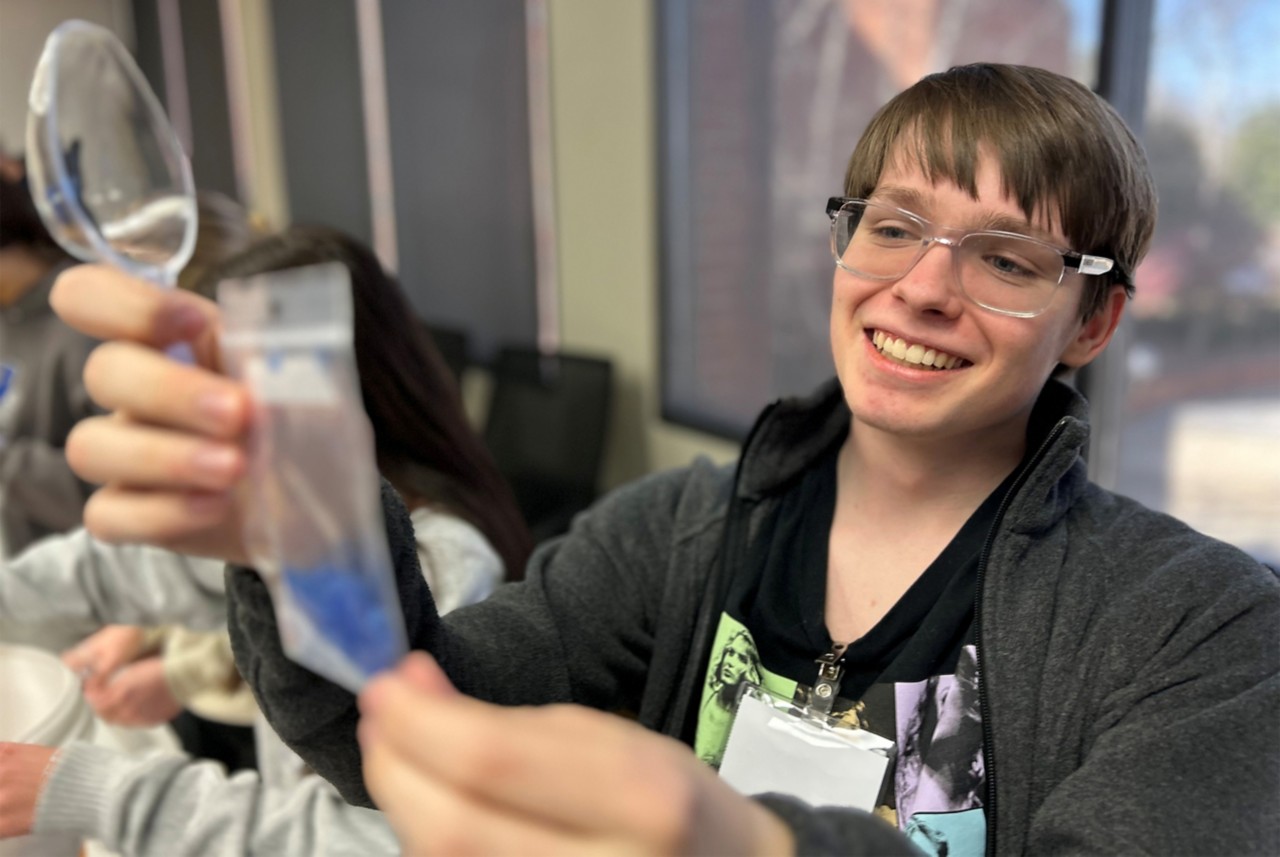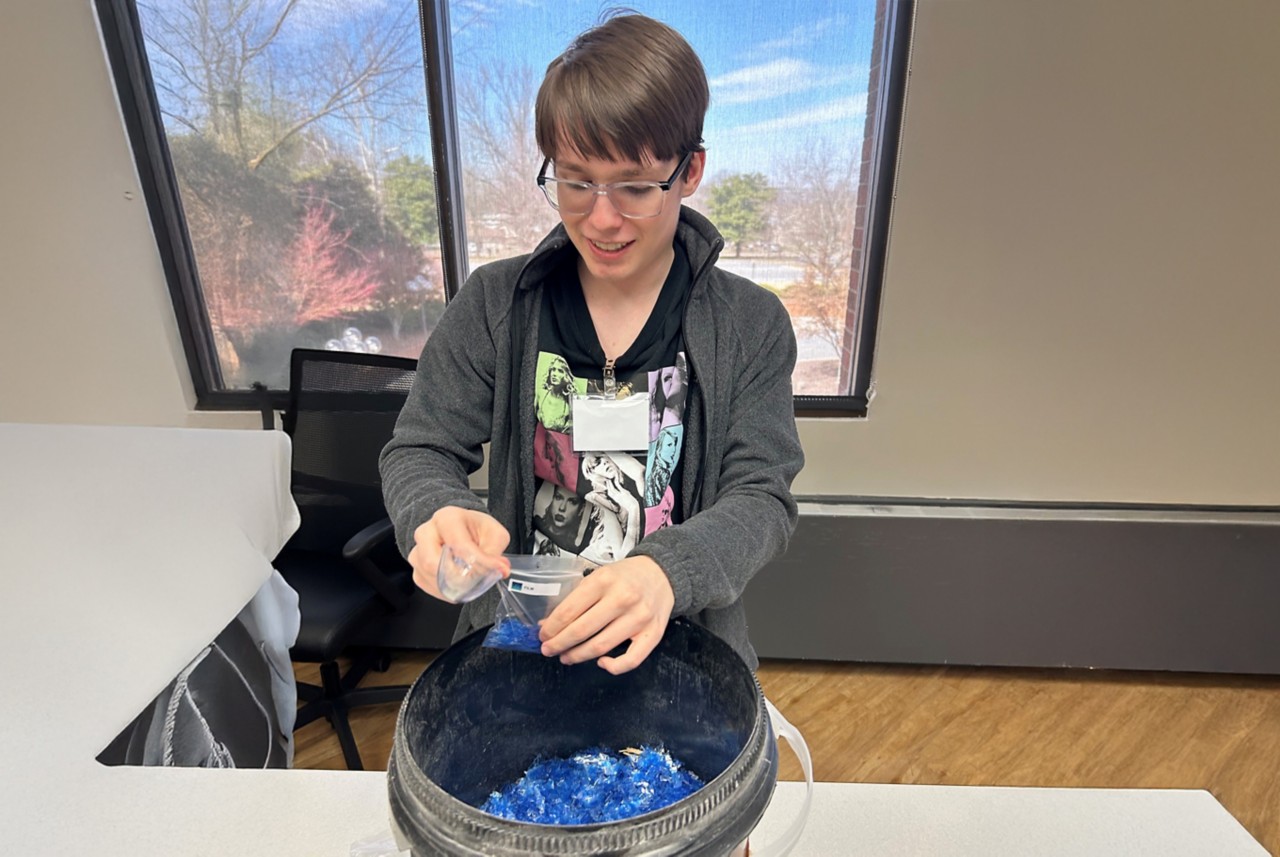Eastman believes the next generation is critical to making sustainable, positive change. That was made evident when several high school students from Kingsport, Tennessee, spent a day at Eastman to learn about next-generation recycling.
Students at Dobyns-Bennett High School in Kingsport got a behind-the-scenes tour of Eastman’s molecular recycling facilities. The group — a combination of Advanced Placement Environmental Sciences students and members of the school’s Environmental Club — also spent a couple of hours discussing plastic recycling and brainstorming recycling solutions for their school. The ideas flowed quickly. That’s not surprising, since these students volunteer to sort out recyclables from trash at their school stadium the morning after football games.
Delaney Morris was enthused to see a recycling innovation — the world’s largest of its kind — in her hometown. “It was breathtaking to see that Eastman can use such a creative process to take plastic back to the molecular level,” Morris said. “Seeing it implemented and talking to people who were passionate about recycling and making the Earth a better place was really cool. And it’s cool to think this is a process that can make a difference not only in Kingsport, Tennessee, but also the entire world.”
Stephanie Blythe, a specialist in circular economy communications at Eastman, was inspired by the youthful energy.
“They had ideas to increase recycling at their school, and they started taking immediate action,” Blythe said. “They got to see Eastman recycling innovations that are making a difference now, and they also heard in our discussions how important collaboration is for sustainable change. It’s inspiring to see such leadership and innovative thinking in the next generation.”

Preparing recycling samples for global education
At the end of their tour, the students assembled sample bags of various plastic feedstocks that are sent by Eastman to companies around the world so that organizations can better understand their hard-to-recycle plastic waste can be recycled instead of ending up in landfill or an incinerator.
For student Abby Davis, standing in front of a mountain of plastic granules that would be recycled by Eastman formed a vivid memory. She knows a thing or two about recycling herself, since Davis started a project to recycle crayons and collected 175 pounds of crayons that would be remade into new ones.
“Honestly, it was shocking to see all that plastic,” Davis said. “Obviously, I know we all need to recycle more, but when you visually see how much plastic there is in a pile that large, it helps you connect the dots.”
Caleb Elkins had a similar feeling.
“I didn’t know much about the differences between recycling processes before I visited Eastman, and I definitely didn’t know that molecular recycling was something that could be infinitely repeated. That’s cool,” Elkins said. “We’ve developed this culture where we just see waste disappear, and we don’t know where it goes, so learning more about recycling is important.”
Dobyns-Bennett teacher Natalie Pickett is the sponsor of the school’s Environmental Club. The group extended their collaboration to other classes at the school: digital media and supply chain management. Pickett said an electric truck owned by the school’s Career Technical Education Department is used to transport plastic waste to Eastman for molecular recycling.
“Our students are very interested in recycling and the environment, so we were excited for the opportunity to learn about molecular recycling,” Pickett said.

Environmental Club extends recycling efforts at football games
When the 2025 Dobyns-Bennett football season rolled around, the D-B Environmental Club got into the recycling spirit again. To reduce the environmental footprint of football events, volunteers from the Environmental Club were stationed at strategic points at the season-opening game, ready to catch any plastic waste. Fans are encouraged to dispose of their plastic bottles and containers responsibly.
Plastic collection will last through the football season. The waste, collected in bins donated by Eastman, will be sorted and used as feedstock at Eastman’s methanolysis facility.
"We're happy to be partnering with Dobyns-Bennett’s Environmental Club on this important initiative," said Chris Layton, Eastman’s director of circular policy and strategy. "Just like in football, teamwork is essential. By working together, we can make a significant impact on reducing plastic waste and promoting sustainability locally."
The high school students are equally enthusiastic about the project.
“We’re very excited to be able to partner with Eastman so that we can make a difference, not only at our school but in our community,” said Caidence Pope, vice president of the Environmental Club.
















